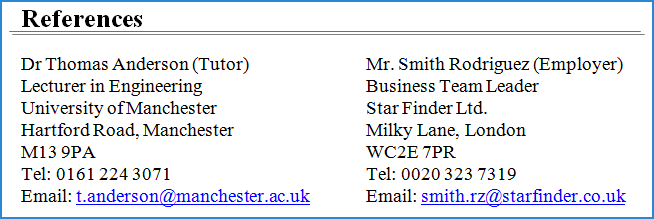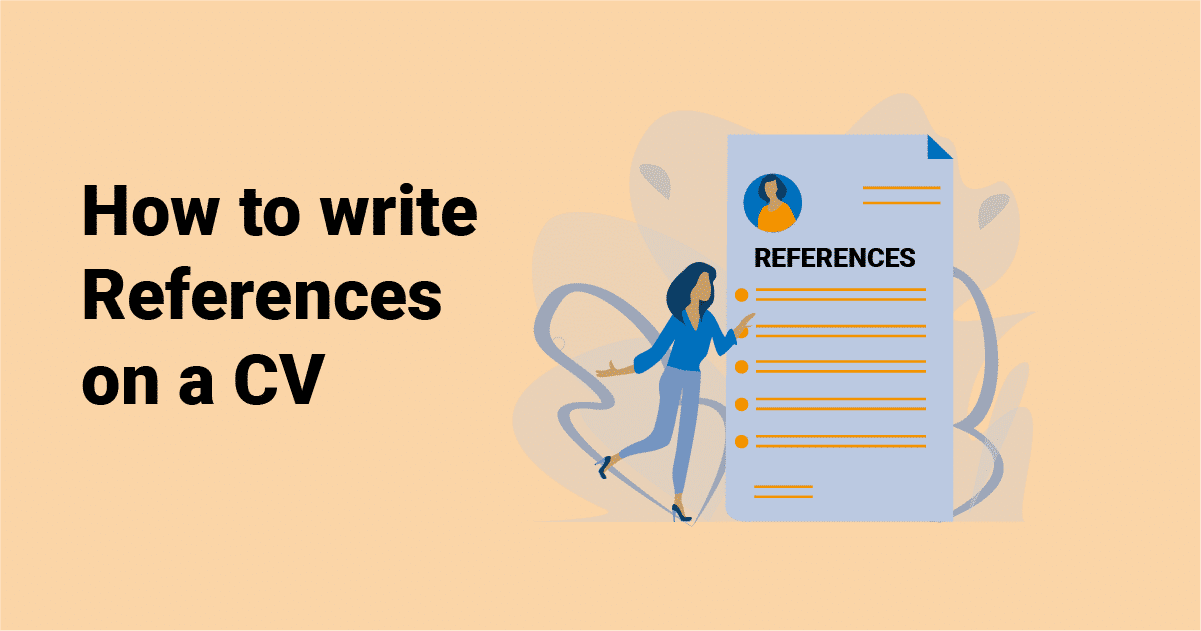The References section on your CV is a vital part which cannot be entirely omitted. Your references should be two people who know you well and have worked with you in one way or another and who can vouch for you to the prospective employer.
The following image shows a good example of how a References section on your CV should look like:

Table of Contents
Benefits of including references on your CV
- Your reference may be a respectable and well-known person which would impress the reader;
- It makes life easier for the employers; they can instantly ‘check you out’;
- It fills up the empty space and makes your CV look complete and finished;
- It gives your CV a little more ‘weight’; that you are confident and that you have nothing to hide.
Who can be your references on your CV?
One of your references should be your current or previous employer, the second referee can be any person who knows you well. They can be your:
- Previous employer
- Current employer
- Manager
- Supervisor
- Teacher / Tutor / Lecturer
- Coach
- Member of clergy
The following are some good attributes that your references should have:
- Clear and well-spoken
- Friendly and engaging
- Authoritative and professional
Remember:
Your references can also tell a lot about you: if they are shy, mumbling and impatient they will inevitable give a wrong vibe about you to prospective employers.
Family members as referees
“My mom knows me really well, can she be my referee?”
She could be, but that means that you’ll probably never make it to the interview stage!
Having family members as your references introduces a ‘conflict of interest’ (bias) into the situation and is consequently not very well received by the recruiters.
How to write references on your CV
For each of your referees include the following details:
- Full name
- Title/position
- (Work) Address
- Telephone number
- Email address
Important guidelines to follow;
- Always give the job title of the referees, otherwise they can just be your mates or any Tom from around the corner!
- Always ask permission of your references before you write them on your CV
- Do not disclose personal telephone numbers, use your referees’ work telephone number
- Always try your best to use your most recent employer as a reference, otherwise an employer may wonder ‘why didn’t he include his recent employer as a reference? What has he got to hide?’
Example of a BAD CV Reference
The following image shows a BAD example of the References section of a CV:

Can you spot the mistakes?
Think about it for a moment, and then compare your findings with the answers below…
Mistakes:
- The applicant didn’t include the full name of the referee
- The applicant didn’t include the job-title of the referee
- The address is long-winded and badly presented
- ‘Tel’ should be ‘Mob’
- Personal telephone number and email address are given (assuming it was done without permission)!
Arguments AGAINST including references on your CV:

Following on from this, we strongly advice against putting references on CVs when:The applicant needs more space to include all their information, omitting the references can free up valuable space to put in the information
You’ve been fired, dismissed, or made redundant by your most recent employer
You do not have two very good references (who are eloquent, well-spoken and professional)
If you do not fall under any of the above mentioned categories, there is nothing wrong with including your references on your CV and is, in fact, a probably good idea to do so.
It has become a common practise amongst jobseekers to include two references on their CVs. In fact, some Career Experts have gone so far to declare that references on a CV are a must!
With all due respect to the other Career Experts, I am afraid that we have to disagree with them on this particular matter. References on a CV are not a necessity.
Yes, it is true that having references on your CV can have some advantages. But (and this is a very big but) the disadvantages are far greater than its advantages.
- References at this early stage of the application process are irrelevant
- It takes up valuable space which can be used for other more useful things
- It could raise more questions if you cannot include your current/previous Employer
- References can be provided upon request, hence; ‘Available upon request.
It can take up a lot of time to find references, ask their personal details and ask for their permission to use their details on your CV, etc.





